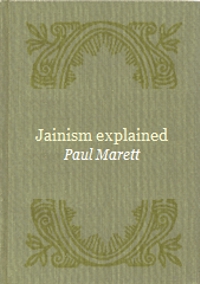
As we have seen earlier, Mahavira started a fourfold organisation of monks and nuns, who can follow his teachings to the utmost limit of human capability, and lay men and women who follow them within the limits of their everyday duties. All can achieve moksha but monks and nuns, because they have no attachments, can follow the path of purification more quickly.
Persons born in the Jain community have a better chance of learning the right path, but any person following the teachings of Mahavira can be regarded as a true Jain.
The aim of the Jain path in life is to liberate the soul and achieve moksha. There are definite rules laid down for lay people and for monks and nuns.
One thing will strike the thinking man or woman who has been brought up in the Jain community, or who looks at Jainism from outside. This is that Right Faith and Right Knowledge must be complemented by Right Conduct.
The conduct of the Jain lay person can be seen from different angles. There is, firstly, the outward practice of rituals, festivals fasts, pilgrimages. Secondly, there is private behavior, the moral way of life laid down in the five principles of non-violence, of truthfulness, of non-stealing and of restraint in sex and material acquisition.
But Jainism is not just outward rituals coupled with a moral way of life.
The private behavior of a Jain includes study, reflection and meditation, which bring the outward practices and the moral life into harmony with the truly religious life.
Non-violence or harmlessness is advocated by many religions: in Jainism it is elevated to the highest principle of behavior. How does this work out in practice? A Jain will obviously avoid occupations or sports which involve violence towards living beings, hunting or fishing for example. Sometimes violence is seen as unavoidable: any Jain should try to avoid harming even the tiniest creature but it is realized that the lay person will unavoidably harm minute one-sensed beings at times. It is impossible to live without harming tiny creatures. Simple acts like lighting a fire or digging a garden may unavoidably harm or destroy small forms of life.
Disinfectants and antibiotics act by destroying the life of minute living creatures: Jains believe that these have living souls just as we have. However Jains are often found in the practice of medicine and even as soldiers. There have been noted Jain generals in Indian history who must have rationalized the destruction of the enemy as an act of unavoidable harm in the defense of their country.
Obviously there can be serious tensions and difficulties for the individual Jain in the practice of ahimsa but it must be remembered that violence is a mental act as well as a physical one. Some, at least, of the effect of violence on the person who performs it is removed if the act is done, not savagely, not thoughtlessly, but with a real feeling of sorrow and regret. Some violence in the necessary performance of one's everyday duties has to be allowable for lay men and women (but is totally forbidden for monks and nuns) because it is unavoidable. It must be remembered that violence may not always take a physical form: hurting the feelings of another may be just as much an act of violence as hurting his body.
To the outsider the most obvious mark of the Jain's concern with non-violence is seen in Jain food. Jains believe that living beings may be possessed of one, two, three, four or five senses (human beings have five senses and the special faculty of the human mind). Our human body is necessary to enable us to clear out the karma from the soul, or jiva, by right conduct.
To support that body we must take nourishment but we can reduce to a minimum the violence and anguish thus caused to other beings by restricting our diet to the one-sensed forms of life. Thus Jains will avoid all food except that derived from plants (which have only one sense, that of touch). Even then care is taken because plants can be hosts to teeming microscopic life, some more than others. Jains avoid root vegetables which have always been believed to contain many minute beings. Certain Indian fruits of the fig family have also been forbidden from ancient times. The fermentation process engenders, it is believed, tiny forms of life, so alcohol is avoided (as well as for its stupefying properties). Likewise eggs, even if unfertilised, are forbidden. Food is not taken at night when insects and the like may inadvertently be consumed.
The basic rules are simple: harm cannot be totally avoided but to minimise it meat, fish, eggs, root vegetables and alcohol are avoided. In spite of these limitations Jain food is wholesome and delicious. Various kinds of beans provide protein, vitamins come from fruit and vegetables,
Spices add flavour, and dairy products, milk and yogurt, are very acceptable. In proper balance these constitute a healthy diet. The influence of Jainism can be seen in the diet of the Indian people.
Truthfulness is the second of the five 'great vows'. Here we have the avoidance of doing harm to others in a less violent way. Truthfulness does not just mean accuracy, but the avoidance of hurtful or slanderous words of untruth about other people. It means sincerity and honesty in business and public life and in personal relations.
Non-stealing is the third virtue. Theft harms the victim: it also harms the thief, for it is bound up with acquisitiveness. Theft is an expression of the desire for material possessions. Theft can take subtle forms, little instances of cheating, tax evasion, unscrupulous business deals and the like. With the emphasis on the virtues of truth and honesty it is not surprising that Jains have often made very successful businessmen.
The last two of the five great vows go quite well together. The Jain seeks to control the desire for the things of this world, for sex or for material possessions. For the layman that does not mean total abstinence from these, but confining them within proper limits. The proper limits exclude extra-marital sex and exclude the flaunting of material possessions beyond the limit necessary for a reasonable standard of living. (It is traditionally advised for a Jain to live on half his income, to save a quarter for old age, sickness etc., and to devote the remaining quarter to charity.)
The Jain path in life involves the cultivation of self-control, the avoidance of passions of desire and hate, an even-minded attitude to hardship and deprivation. The lay manor woman, caught up in the business of family and work, cannot lightly abandon the things of this world but in the early stages of spiritual training he or she will try hard to reduce dependence on them. Following the path of Jainism, he or she will have high ethical standards. This will include living within one's limits, hospitality and consideration towards others, control of the temper and avoiding harsh or slanderous words, appreciating the good points of others. Violence and misdeeds will be the occasion for regret and sorrow. Such a person will cultivate equanimity which will make it possible to cope with the joys and troubles of life.
To help in the observance of the five great vows there are some supplementary rules which a lay person can undertake to observe. They are a form of self-discipline, like not moving outside a determined area for a certain time, either a wide area (like one's own country, or beyond the mountains or river) or a small area (one's village or garden perhaps). In the first case the vow will apply for a lifetime, in the second for a day or so up to a year. Those are the first two supplementary vows.
The third involves refraining from acts, thoughts and words which are harmful and purposeless: these can range from idle chatter to obscene speech and will include accumulating unnecessary possessions.
Fourthly, the individual can make a vow that he or she will reduce attachment to material things by giving up certain foods or other objects of use for a fixed period.
Next comes samayika or meditation. This really means achieving equanimity and it ought to be practised two or three times a day. Sixthly, certain days of the month should be observed as days of fasting, coupled with other restrictions to bring the layperson's life for those days as near as possible to that of a monk or nun.
Lastly comes the vow not to take food oneself on any day until after providing for the needs of a monk or nun or others.
The five vows and the seven supplementary ones form the layperson's basic code of conduct. One final stage remains for the lay person (or indeed for the monk or nun): that is known as sallekhana. When old age and infirmity are advanced and the body can no longer be used for good purposes, the Jain may complete the abandonment of the things of the world by quietly and gradually giving up all food and drink, whilst keeping the mind occupied in meditation and religious activities, until death supervenes. Jains do not like the word 'suicide' for this, for no violence, in action or mind, is involved. It is the highest form of non-violence where violence in action and mind are avoided to the maximum and thus it helps the spiritual advancement of the soul. (A similar practice was followed by the religious sect of Cathars in medieval Europe.) Sallekhana is the ultimate spiritual discipline, followed, of course, by only a few people but regarded as bringing the present life to a meritorious close.
 Dr. Paul Marett
Dr. Paul Marett
